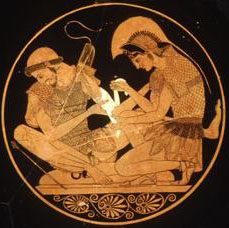![[Loyola University Chicago]](http://www.luc.edu/images/loyola.gif)
|
CLST 272-001: Heroes and Classical Epics
|

|
Fall Semester 2015
Dr. Jacqueline Long
MWF 8:15am - 9:05am
Crown Center 140
Performances and Performance-Papers
Goals
- To collaborate in a creative endeavor complementing course work
- To experiment with performance of figures and stories from
Classical epic
- To share your insights about the text with your classmates through performance
- To reflect on the processes of insight, performance, and Classical
epic, in light of a specific, shared creative experience
- To have fun doing it
For the performance:
Members of the performance team, jointly in consultation with one
another
- select and adapt section(s) of the epic you have agreed to present
- pick important sections, and identify what makes them important
and interesting
- how do your selections advance the story?
- what do your selections reveal about actions, characters, events,
relationships, ideas, values, or other concerns to which the epic draws
attention?
- what resources of literary production do your selections use so as to
do the things you identify them to be doing?
- feel free to adapt your selections creatively so as to make for an
effective performance: connect, condense, transpose, enhance!
- incorporate into your performance significant, clearly accessible
commentary on the insights you are presenting
- It is appropriate to make use of published scholarly inquiries
into our epics or related questions in order to inform your understanding
of your team's books, and the choices you make in presenting interesting and
valuable insights. This guide to
Beginning
Research on Topics in Classical Studies offers some strategic suggestions.
- Books and articles cited in the introductions, notes, or bibliographies
of Fagles's translations (also Lattimore's, if you're using
them as an alternative) are good resources, as are items in
Diotima. Titles are always a good
first-look guide to the topic a study has taken for itself.
- Do not limit your research to commercial products like Cliff Notes
or Spark Notes. Some of them are better than others, but they are not always
prepared with very good knowledge of the Classical cultures from which these
works come, and they sometimes make truly embarrassing errors. Even when they're not
flat-out wrong or distorting with anachronistic perspectives, they tend
to oversimplify. All the same cautions apply to information posted on-line.
- No matter what resources you use, you MUST credit them, all of
them, in the appropriate academic format, when you go to write up your work in your paper.
Otherwise it's plagiarism. Plagiarizers fail (see the statement on
Academic Integrity under
Policies, and resources there).
- your adapted selections will need to be performed in the classroom, with
its resources, within 15-20 minutes of class time - we will be on a tight
schedule, so presentations that run over will have to be cut off.
- decide what members of the group will do supporting your performance of your selections, so
as to bring out their interesting and important aspects and engage us all in
an entertaining and illuminating experience
- execute your plans
To hand in, at the class meeting of the performance:
Each member of the performance team, individually, compose and type up
a 750-900-word essay (3 typed pages) explaining the following points.
Write your report as an
essay,
defining and proving a brief but cogent central argument. One of the
important purposes of this exercise is to give you practice writing good
academic papers.
- What significant ideas about the heroic world of the epic and techniques
of epic story-telling do the section(s) you
selected represent? What about them makes them important for understanding how
the epic operates as a literary work?
- How has your performance has been designed to display and
experiment with these elements?
- Support your explanations by referring to specific, concrete information, in
the text you're working with and in your performance, and showing how it backs up the
claims you are making.
- Credit all secondary sources you use to inform and prepare your performance and
paper. Again, it's a matter of maintaining your
academic integrity, and again, you must do it
in all your academic work. Bibliographic footnotes should use the form (for books) Firstname Lastname,
Book Title (Place: Publisher, Year), specific pages for the information
you're citing; (for articles) Firstname Lastname, "Article Title," Journal Title
volume-number (Year) page-range of the article within the journal: specific pages for
the information you're citing.
- Your primary source, that is, the text you're working with, needs to be cited too
-whether you are paraphrasing or quoting- identify all
passages you discuss by giving the book and line-numbers in parentheses.
I'll assume you're using the Fagles translations officially ordered
for this class, so if you're using a different one, please identify it in a footnote,
too. Thanks!
- And while we're on the subject of correct format, let me repeat here the
plea that good academic writing and correct format are urgent because
they benefit YOU: Write
as carefully as you can. Use complete sentences. Make sure you express your ideas
grammatically. Use apostrophes
correctly. Proofread. Even though I'm not grading for format specifically, sloppiness
messes up the clarity of your ideas. The more you can use college-level writing to
establish good habits of written expression, the better you will serve yourself in
everything else you go on to do. If you feel wobbly on any of the skills involved,
please come seek help: from me (come to my office hours with a draft, and we can work
through it), from the Writing
Centers (sponsored by the Department of English: graduate students with expertise
in writing pedagogy; Sullivan Center 245 and on the Water Tower Campus in 25 East
Pearson 605), and from the Center for Tutoring
& Academic Excellence (Sullivan Center; peer-counselors), for three starts. You are always welcome.
Thanks!
BACK to CLST 272 homepage

Revised 3 August 2015 by
jlong1@luc.edu
http://www.luc.edu/classicalstudies/
![[Loyola University Chicago]](http://www.luc.edu/images/loyola.gif)

![[Loyola University Chicago]](http://www.luc.edu/images/loyola.gif)

